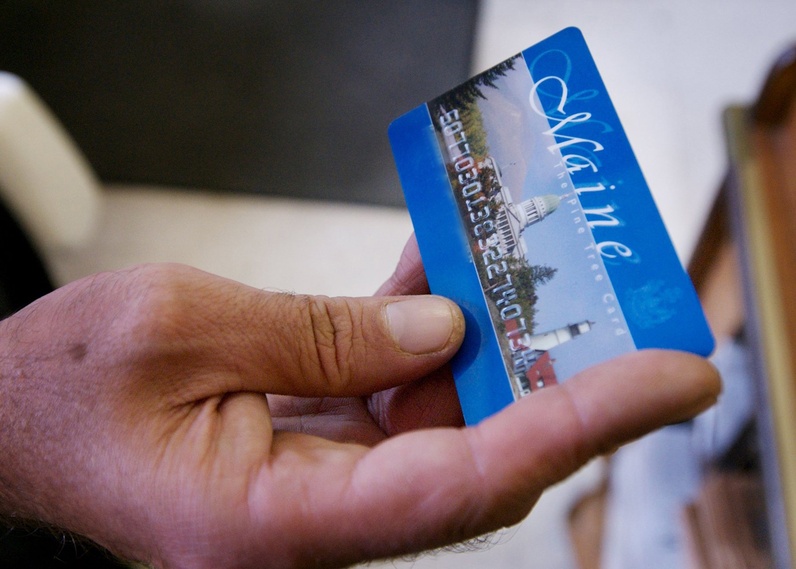AUGUSTA –– The LePage administration on Monday continued its public push to enact a slate of welfare reform proposals, an effort meeting stiff resistance in the Democratic-controlled Legislature and one that could play into the upcoming election.
The administration repurposed data released in January showing that $14 million worth of electronic benefit transfer – or EBT – card transactions were made out of state in 2013. The administration said the data shows that the governor’s proposal to ban out-of-state use of EBT cards for cash-welfare assistance through the Temporary Assistance for Needy Families program should be passed by the Legislature.
It’s unclear how many of the 365,000 out-of-state transactions in 2013 were for TANF cash assistance. However, data supplied by the state Department of Health and Human Services showed that about 7 percent of all EBT transactions made by about 224,000 active card holders in Maine were used to withdraw cash.
EBT cards dispense an array of benefits depending on a person’s eligibility. EBT cards also include food assistance through the Supplemental Nutrition Assistance Program, which allows for specific purchases – such as bread and dairy products – and prohibits others, such as liquor, cigarettes or nonfood items. In addition, EBT cards can dispense cash through a refugee assistance program and a work training program that allows for the of purchase clothing or child care.
The Portland Press Herald asked the DHHS for a breakdown of cash EBT transactions. The department reported 14 million EBT transactions in 2013, including 979,805 transactions to withdraw cash. The remaining 13 million transactions were for food assistance through SNAP.
From 2011 to 2013, cash transactions accounted for 5 percent of all EBT use.
The DHHS said it could not provide comparable data for out-of-state transactions.
At a State House news conference Monday, the administration continued to emphasize EBT transactions at travel destinations such as Las Vegas, Florida – including Disney World – and the Virgin Islands as evidence of a misuse of funds.
“Maine taxpayers are outraged with their hard-earned tax dollars being used this way,” said DHHS Commissioner Mary Mayhew. “They should be. The best way to ensure that our limited tax dollars are helping poor people who live in Maine is to eliminate the ability to use EBT cards out of state. If Mainers are eligible for this benefit, spending should occur within Maine, not fuel other states’ economies.”
Attorney General Janet T. Mills, a Democrat, has warned that the proposal banning out-of-state EBT use may be unconstitutional because it hampers an individual’s ability to travel. Advocates for the poor have said the proposal would pose a hardship on needy families who may have relatives who live and work in other states, or on migrant workers who live in Maine only part of the year.
Minnesota is one state that has prohibited out-of-state EBT use except in border states. Mayhew did not directly answer when asked if the administration was open to amending its proposal to allow EBT use in New Hampshire. According to EBT data released by the administration, $9 million of the $14 million in out-of-state spending occurred in New Hampshire.
Mayhew also hit back at critics of the governor’s welfare initiatives who say the crackdown is politically motivated and vilifies the poor.
And she criticized Democrats who have characterized the amount of potential EBT misuse as being a fraction of the transactions of those who use the benefits as intended.
Under the LePage administration, Mayhew said Monday, the “acceptable amount of welfare abuse is zero.”
Democrats have criticized the administration for not enforcing current welfare abuse laws, including one adopted in 2012 that prohibits the use of EBT cards at a variety of locations, including gambling facilities, strip clubs, and retail establishments where 50 percent or more of the revenue is derived from liquor sales.
A proposal by the LePage administration would ban specific purchases, such as alcohol, cigarettes, lottery tickets and bail.
All of the governor’s proposals face political and logistical obstacles. Their rejection, however, could have political consequences for Democratic lawmakers, because legislation portrayed as curbing the misuse of public assistance benefits is often popular with the public.
Steve Mistler can be contacted at 791-6345 or at:
smistler@pressherald.com
Twitter: @stevemistler
Send questions/comments to the editors.



Comments are no longer available on this story